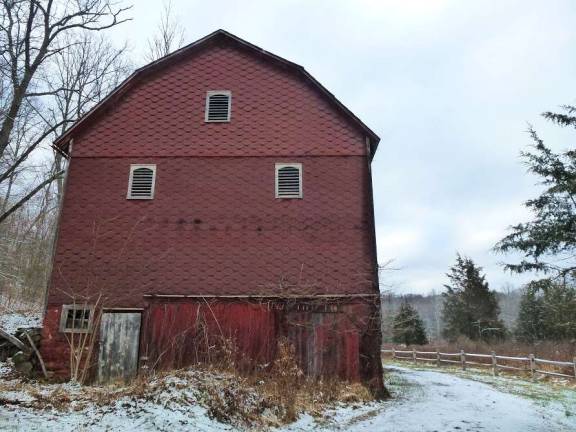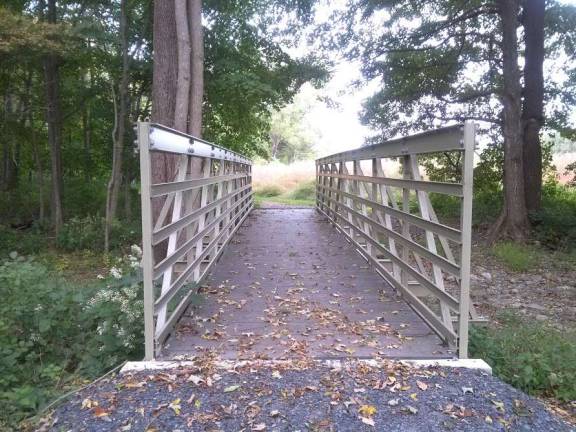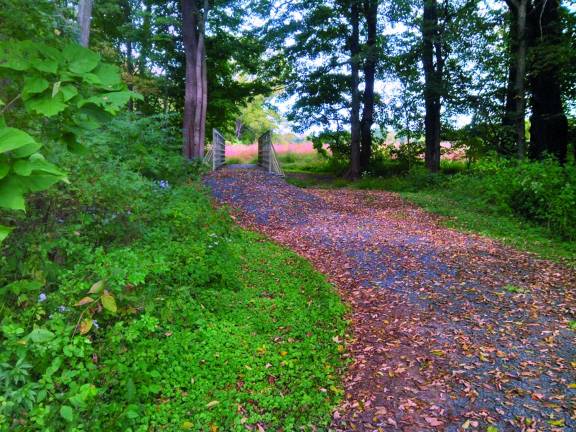31 miles of easy street



Another acorn falls with a crack, like the report of a rifle. Startled, I look around, careful not to turn my body the wrong way. This keeps happening. The squirrels are delirious amid this year’s plenty. They race from treetop to treetop, shaking the mast so that it falls like hail.
I’m feeling jumpy. My right arm is in a sling, my left hand grips a hiking pole that I tap-tap-tap on the ground like a cane as we walk south on the McDade Recreational Trail. Tom is telling me about the last person he knew with a broken collarbone, the friend of a friend who joined a party at his family’s camp in Pennsylvania. It was the 1970s, Mom and Dad weren’t there, and the friend’s friend, in the woods for the first time, wanted to contribute something to the campfire. So he starts hacking away at a dead tree from which a great big limb dangled precariously overhead. Tom told him to get away from the tree, but of course the lad didn’t listen and of course the limb fell and landed squarely on his collarbone, felling him as if he’d been struck by an ax.
No one at the party knew where the nearest hospital was, but the lad said he’d never go anyway (“I can’t afford it, man”). He spent the rest of the weekend on a fold-out sofa nursing his shoulder, which eventually swelled to the size of a second head. He got up, yelping miserably, only when he had to piss. His peers, when they thought of it, would bring him a beer or a toke. He left at the end of the weekend, and no one ever saw him again.
I tap the ground and await the moral of the story, which, of course, is that there would be fewer broken collarbones in the world, and less misery generally, if we all just listened to Tom. It’s true that he warned me about carrying that heavy cooler down the basement stairs. And though I brushed him off and promptly went tumbling down, he’s stood by me. He helps me tie my hiking boots. He carries my water and my lunch. He extends his arm to help me over rough patches. In this manner, we’ve been making our way from Milford Beach to White Pines, from Schneider Farm to Egypt Mills, from Bushkill Village to the Turn Farm, and from there to Hialeah.
The 31-mile McDade Trail is long enough to keep us busy with section hikes while my collarbone heals. Bicycling and kayaking are out, and climbing too, and any trail rough enough to make me stumble. But I can handle the McDade. It’s mostly level and covered with packed gravel that actually complies with the Americans with Disabilities Act. And it’s wide enough for two or more hikers to amble amiably side by side.
I’d never known quite what to make of the McDade, as if the trail itself doesn’t know what it wants to be. It’s not a wilderness trail. It runs through a federal park, the Delaware Water Gap National Recreation Area, but runs parallel with Route 209, sometimes right along the guardrail, so that the whoosh of cars is never completely absent. It’s not a great biking trail either. The longest section suitable for riding is less than six miles. It’s not a bridle path, and in winter, the trail isn’t groomed for cross-country skiing.
Still, the McDade does what the best trails are supposed to do: take explorers to the finest parts of spectacular landscapes. We’ve walked through long, curving colonnades of towering pines. We’ve passed derelict farmhouses and vagabond crabapples, fields of tall grasses and low walls of river stone, the Raymondskill Cliff rising dramatically from the bottomlands, with the Delaware River shimmering all the while through the trees. We rarely see anyone else along the way. The colonnades and the crabapples belong to us alone.
This long-civilized valley is having a civilizing influence on me. I take Tom’s arm, and he leads me to a sunny spot by the river. I spread a little checked cloth on the ground. Tom hands me a peanut butter sandwich. The wind picks up, and the acorns come tumbling down.